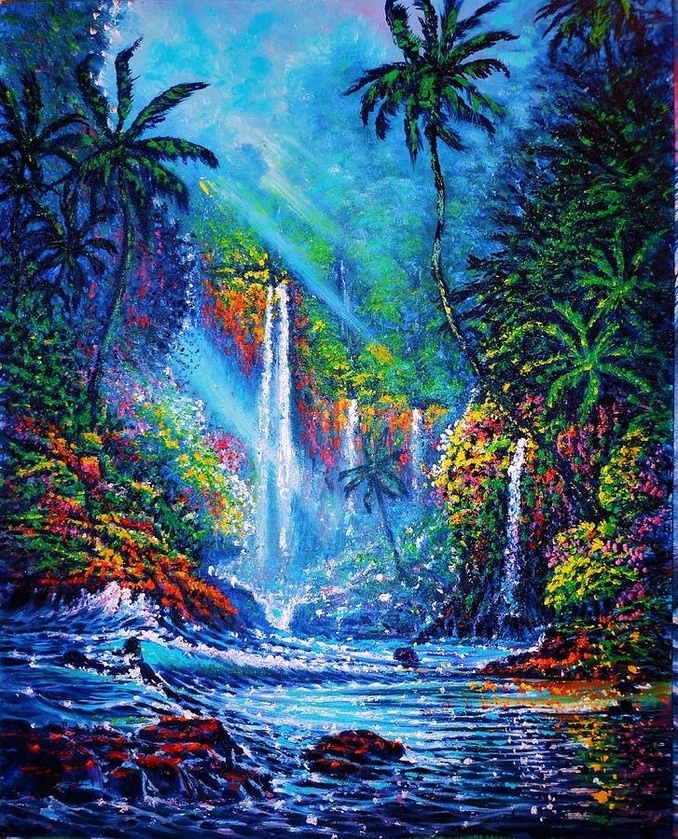Ezekiel 47:12
"Fruit trees of all kinds will grow on both banks of the river. Their leaves will not wither, nor will their fruit fail. Every month they will bear fruit, because the water from the sanctuary flows to them. Their fruit will serve for food and their leaves for healing.”
Ezekiel saw, in his vision of the new temple, a river of water coming out from under the altar at the southern side which then poured out into threshold of the temple toward the east. He saw a great number of trees on each side of the river. As he followed the river as it grew in size and fierce energy, he noticed it was emptying into the Dead sea. He saw multitudes of creatures of all kinds living wherever the water flowed. The river made the salty water fresh and every kind of living creature thrived along its banks. The Jordan Valley becomes a lush fruitful landscape where God's Eden garden is reborn. And the Lord is there. In fact the name of God's city is literally named "the Lord is there".
"And in that day it shall be – that living waters shall flow from Jerusalem" (Zechariah 14:8).
This recreation of the landscape is not achieved through human ingenuity, technology, or effort; it is the result of The LORD lifting the curse and replacing it with his blessing. This river of life flows out of the house of God, and wherever it flows it creates life. It follows the path that The Lord took when he enters the temple. It passes through the East Side, his gate, the closed gate. And this stream flows into a mighty river. In just a mile or so this waist deep stream becomes a powerful transformative river that cannot be crossed. It even transforms the Dead Sea which stood for so long as a symbol of the curse. The bitter becomes sweet, the unhealthy is healed, and the dead is made alive. A visible reminder that God can turn death to life.
"A fountain shall flow from the house of the LORD" (Joel 3:18).
And in this garden, along the banks of his River of life grow these amazing fruit trees. On both sides they grow. And there is something new about their culture, they never wither. They produce food every month and medicine is made from their leaves. It seems that the life giving energy of that river infuses these trees with God's Spirit. These are a new kind of plant life, like nothing mankind has seen since the fall. How healing will come from the leaves is not clear, but sickness will be virtually eliminated. God will use these trees to meet people’s physical needs.
Fundamentally, this shows us the miraculous nature of a real river in a real Messianic kingdom to come. Yet by spiritual analogy, there is a powerful picture of increasing progress and depth in our own spiritual life as we flow through God's path, and walking with him we receive his spiritual food. As we walk through the various depths of his river we receive a greater and greater awareness of his power. We start out “floating in our faith, passively barely keeping our head above the water. And in time we progress to swimming by faith. And so we must keep watch so that we learn to become expert swimmers. God river of life is saving us from the floods of sin. We cannot merely wade poolside, never searching the river's depths, and hope to survive the storm water floods. We must learn about our own shallowness and swim out into the river of life that is God's enduring word.
And most notably to me in this recreation story, there is no forbidden tree, no forbidden fruit. There is a harvest not once a year but every month. And ultimately this life restoring trickle pouring out from the Lord's porch creates a fantastic opportunity for fishing.
This is where I will be found in the kingdom. I'll be in the garden, possibly tending to the trees, and fishing in the river of life.
But for now I swim in the river of life that is God's word flowing out from the Holy Spirit. And work as a fishing guide for making fishers of men.
“Let anyone who is thirsty come to me and let the one who believes in me drink. As the scripture has said, “Out of the believer’s heart shall flow rivers of living water”.
(John 7.38)




















